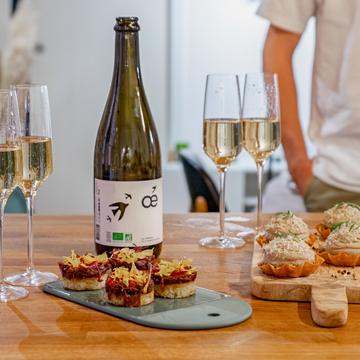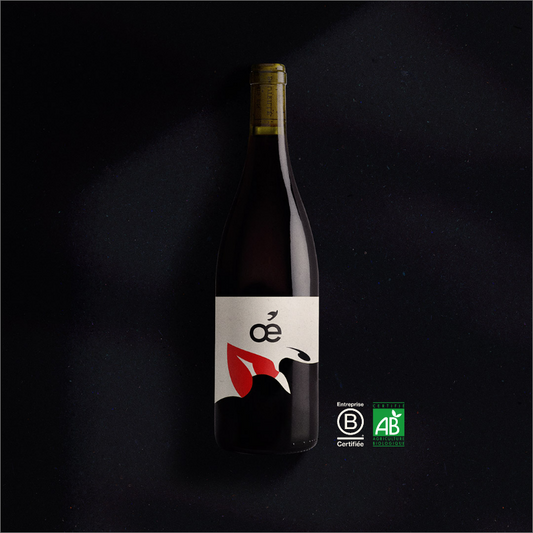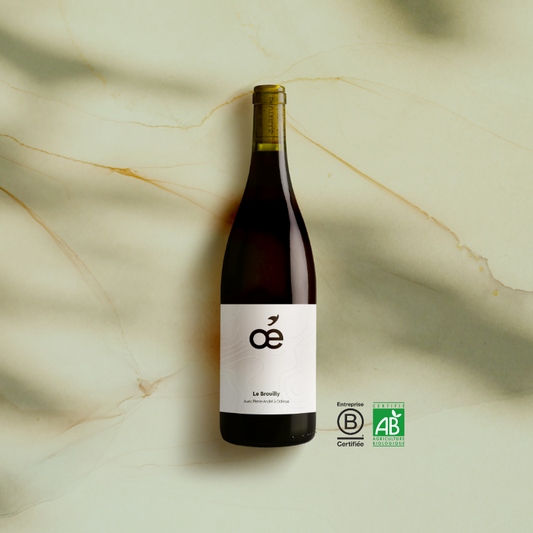The colors of rosé wine: the whole range of colors
“When he takes me in his arms, when he speaks to me softly, I see life in pink!”
Are you also under the spell when you enjoy a glass of rosé, one spring evening, at sunset with the chirping of birds announcing the return of sunny days? In any case, at Oé, these are moments that captivate us!
The color of rosé wine, a mixture of white and red?
Some people think that it is enough to mix white wine and red wine to make rosé, but in truth, it is a little more complex than that. We will explain everything to you !
The color of rosé wine: the vinification techniques of the winemaker
When we were in plastic art class (yes, it goes back a bit…), we all remember the primary colors , the mixtures of colors and the drawings in paint!
Pink is a little red paint and a little white paint. Get out the brushes, we're drawing a glass of rosé!
Not so fast, rosé wine is not obtained by mixing red wine and white wine except to make certain rosé Champagnes . Saignée rosé Champagne comes from a blend generally made up of a clear white wine (about 80%), ie before foaming, and a non-tannic red Champagne wine.
If you are a big fan of sparkling wines , you can read this article and also discover our sparkling wine, our deliciously committed crémant d'Alsace .
The color of rosé wines comes from anthocyanins, the natural pigments present on the skin film of the leaves and fruits of the vine .
To make rosé wine , the winemaker can use three different winemaking techniques :
- Maceration rosé : as for red wine , it macerates the juice with the pips, the skin and the pulp to capture the color and the tannins . It is the maceration time that is different, only a few hours (up to at 24h) for rosé wine , whereas it can take several days for red wine . The more the must is in contact with the skin of the grapes during maceration and fermentation , the more intense the color of the wine will be.
- The pressing rosé : just after the harvest of the vines , the harvested bunches of grapes are directly pressed to obtain the juice which then ferments in vats
- Bleeding rosé : this rosé is obtained by removing part of the juice intended to make red wine and vinifying it separately.
If you want to know more about rosé winemaking techniques, we tell you more in this article .
Rosé wine is therefore, like red wine , produced only from black grapes with white pulp. But the winemaker can make blends of grape varieties. No jealousy, everyone has their own tastes. ;)
The different color shades of rosé wine
Salmon pink, candy pink, pastel pink, when you want to repaint your bedroom or living room, you have enough to get lost in the paint department! But is it the same for wine?
Finally, a little, there are many shades of colors for this wine, but be careful, do not use wine to paint your walls, you risk having bad surprises...
In any case, one thing is certain, the shades of rosé colors are a dream: Roses, Coral, Rose Petals, Rose Milk, Magnolia, Salmon Rose, Magenta, Rosewood, Peach... How not to crack?
Why is the color of rosé wine not always the same?
You have understood, there is a beautiful palette of shades of rosé… We give you all the balls to understand how it works and to show off at dinner!
Color of rosé wine: the role of maceration
We're all waiting for summer to bask in the sun, sip a chilled glass of rosé and compare our tan with friends. The more we are exposed to the sun, the more the color of our skin changes thanks to melanin, the famous pigment that colors our skin (watch out for sunburn, crayfish red, it stings!). As far as wine is concerned, its own tan moment takes place in the vats, when it is macerating. To obtain light rosé, it is therefore necessary to stop the maceration quickly, while to obtain dark rosé, it is left to enjoy its bath. Put away the bathing suits, take out your most beautiful dresses!
Color of rosé wine: the role of aging
Rosé wine is only aged in vats (stainless steel or concrete) unlike red wine which can be aged in barrels, or in barrels as our friends in Bordeaux say. Good rosés can still be kept in bottles for a few years in your cellar and depending on the grape varieties chosen by the winemaker, some rosé wines even develop a nice tannic structure . Over time, the color of your wine also changes. The color of white wine tends towards gold, that of red wine towards brick color and rosé wine also tends to darken, tend towards coral color and almost resemble young red wines . To find out if your wine is mature , we suggest you read this article .
Color of rosé wine: the role of the grape variety
There is no smoke without fire, no wine without grapes . You still have to choose the right ones!
As we talked about earlier, rosé wine is made only from black grapes with white flesh, but there are many of them, so it's not always easy to know which ones to choose...
Yes, even if they are vinified in the same way, Muscats , Pinot or Cabernet will not give the same wine. The tastes , the aromas and the typicity of the wine are intimately linked to the grape variety, the rascals !
Do you prefer it light , fruity , syrupy , soft , mineral , with a hint of acidity , all in finesse ...? The winemaker knows his grape varieties and their particularities well, so to offer you his best wine, he does several tests, blends and tastings to find THE right formula. Tasting wines when they are young also gives you another tasting experience , so immersing yourself in the history of Beaujolais Nouveau is exciting.
Have fun with a good rosé
Ah, rosé, that guilty pleasure you can't resist... and you're right!
Rosé wine, even before being a treat on the palate, is a visual gem. At Oé, we removed the capsule from the bottle so that you can fully see the beautiful cork stopper (and also because it's greener we won't hide it) and we put a pretty label on you that tells its story.
For a successful tasting , we observe the beautiful color of its rosé and we appreciate the aromatic fragrance it gives off by placing its nose just above it. We close our eyes and let ourselves be transported by the fruity , floral or vegetal notes it releases. It's as if he were reciting a spring poem to us.
To please you with good fruity and fresh rosés in the mouth, let yourself be tempted by our Corbières and its pretty salmon pink color. Mouth watering? We reassure you, we too!
If you like dry rosés , you can choose the Côtes-du-Rhône wines , such as Tavel, a typical Gard AOC .
Treat yourself too by discovering our organic Provence wines , organic Vaucluse wines , organic Bordeaux wines , organic Languedoc wines , organic Mediterranean wines , organic Côtes du Rhône wines .










